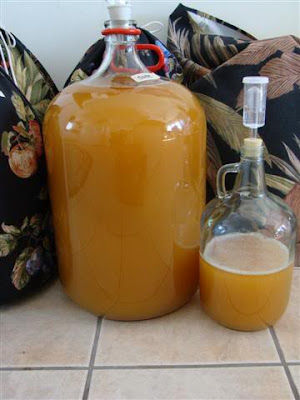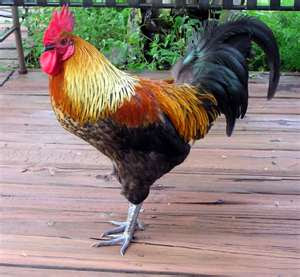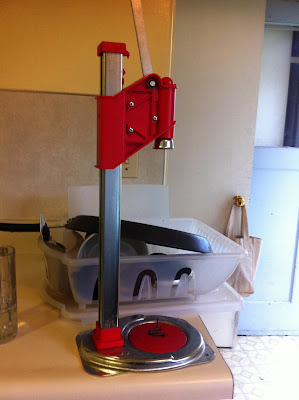Friday, October 28, 2011
Protest as a Way of Life
Posted by Aimee at 2:37 PM 4 comments
Labels: politics
Monday, October 24, 2011
The King Must Die (Goat Breeding and Divine Kingship)
I used to have my own buck. Storm Cloud, son of Flopsy, was (and presumably still is) an extremely handsome, healthy and virile tri-color purebred Nubian buck. He is black and white with brown points, tall, big-boned, from excellent milking lines, and also good natured, with healthy hooves, and never had a problem with parasites. Pretty much the ideal buck, in other words.
Posted by Aimee at 4:06 PM 3 comments
Thursday, October 20, 2011
Brewing Up a Storm (Drinking and Driving)
 My first batch of hard cider came out great! I can't take all the credit - or even most of it - or, in fact, hardly any of it at all. I pressed the apples, but J. (my homebrewing friend who moved away and gave me all his equipment - see Cider, Revisited) found the recipe and walked me through the beginning of the process with little baby steps.
My first batch of hard cider came out great! I can't take all the credit - or even most of it - or, in fact, hardly any of it at all. I pressed the apples, but J. (my homebrewing friend who moved away and gave me all his equipment - see Cider, Revisited) found the recipe and walked me through the beginning of the process with little baby steps. Posted by Aimee at 12:03 PM 1 comments
Labels: apples, biodiesel, brewing, husband, self-sufficiency
Saturday, October 15, 2011
The Great Hen Giveaway (It's Not His Fault)
 We had too many roosters - eight, which is six more than we needed. I advertised six free roosters on Craigslist. A man called, and I told him to come pick them up after dark, when they would be easy to catch. As it turned out, I was at the grocery store when he showed up, so my husband caught the roosters and gave them to the man.
We had too many roosters - eight, which is six more than we needed. I advertised six free roosters on Craigslist. A man called, and I told him to come pick them up after dark, when they would be easy to catch. As it turned out, I was at the grocery store when he showed up, so my husband caught the roosters and gave them to the man.Posted by Aimee at 4:58 PM 2 comments
Friday, October 14, 2011
Filling Up the Freezer (Great Grapes!)
It was an insanely beautiful day today - much nicer than late October has any right to be. The sun was out in full glory, and I could feel the heat on my shoulders all day long as I completed various fall chores. This has not been a good year for leaves, and so even though the sky was a bright, washed blue, I did miss the sharp contrast of the yellow, gold, and red leaves against it.
Posted by Aimee at 5:55 PM 3 comments
Labels: preserving, seasons, self-sufficiency, winter
Tuesday, October 11, 2011
The Yucky Season Arrives (October Images)
 Not everything about October is yucky. Apples, for instance. I love apples. I love apple season. I love the smell of the kitchen when an apple pie is in the oven, or the dehydrator is full of apple slices, or I am canning applesauce. I love pressing apple cider, even though it makes my back and hamstrings hurt for days. I love biting into a crisp green apple, juicy and tart, and following it up with a bite of sharp, homemade cheese. I love the amazing abundance of apples - so many forgotten trees, with so much surplus fruit that it falls all over the yard and the roadsides, free for the taking. I like giving windfall apples to my animals - every species loves apples. The horses, of course, but also the goats, the pigs, the chickens, and even the rabbits. Everybody loves apples. Even the apple-mast left over from pressing is useful; it makes wonderful compost. I love the look of apple trees in November, after most of the leaves have fallen but the apples are still clinging to the bare branches, bright red against a frosty blue afternoon sky.
Not everything about October is yucky. Apples, for instance. I love apples. I love apple season. I love the smell of the kitchen when an apple pie is in the oven, or the dehydrator is full of apple slices, or I am canning applesauce. I love pressing apple cider, even though it makes my back and hamstrings hurt for days. I love biting into a crisp green apple, juicy and tart, and following it up with a bite of sharp, homemade cheese. I love the amazing abundance of apples - so many forgotten trees, with so much surplus fruit that it falls all over the yard and the roadsides, free for the taking. I like giving windfall apples to my animals - every species loves apples. The horses, of course, but also the goats, the pigs, the chickens, and even the rabbits. Everybody loves apples. Even the apple-mast left over from pressing is useful; it makes wonderful compost. I love the look of apple trees in November, after most of the leaves have fallen but the apples are still clinging to the bare branches, bright red against a frosty blue afternoon sky.
 I also like pumpkins. I like carving jack o' lanterns with my kids, and I like roasting the seeds and putting them in the kids' lunches for weeks after Halloween. I like eating pumpkins, too - in almost any form: simply roasted with butter and salt and pepper, as pie of course, and in soup. Oh I love delicious pumpkin-cheese soup with roasted poblano peppers. I like the empty fields, dark brown, bare and bedraggled looking, dotted with bright orange orbs. I love going outside on Halloween eve and looking at the glowing jack o' lanterns lined up on the porch. It makes me feel cozy and safe, remembering that their original function was to serve as guardian spirits, protecting the house and inhabitants from evil forces abroad in the nighttime as the year tips into darkness and death.
I also like pumpkins. I like carving jack o' lanterns with my kids, and I like roasting the seeds and putting them in the kids' lunches for weeks after Halloween. I like eating pumpkins, too - in almost any form: simply roasted with butter and salt and pepper, as pie of course, and in soup. Oh I love delicious pumpkin-cheese soup with roasted poblano peppers. I like the empty fields, dark brown, bare and bedraggled looking, dotted with bright orange orbs. I love going outside on Halloween eve and looking at the glowing jack o' lanterns lined up on the porch. It makes me feel cozy and safe, remembering that their original function was to serve as guardian spirits, protecting the house and inhabitants from evil forces abroad in the nighttime as the year tips into darkness and death.  I like el Dia de los Muertos, the Mexican Day of the Dead. We celebrate it here in the old fashioned way, by dressing the household altar with an ofrenda, or offering. We drape the altar with a bright colored cloth and lay it with fruits and flowers. We set up the photos of our dead ancestors, or if we don't have photos, then we write their names on slips of paper. We light candles and drink hot cocoa and (for the adults) mezcal. The children and I bake sweet egg-bread in fanciful shapes and eat it dipped in the hot cocoa. We talk, tell stories about our dead loved ones, and honor their memories. Always on the altar is a memento mori in the form of a beautiful little Caterina statue (Lady Death). In this way, we teach our children - and remind ourselves - that the end of all life is death, but that spirits live on as the beloved, beautiful memories that we leave behind. This simple ceremony provides surprisingly strong comfort.
I like el Dia de los Muertos, the Mexican Day of the Dead. We celebrate it here in the old fashioned way, by dressing the household altar with an ofrenda, or offering. We drape the altar with a bright colored cloth and lay it with fruits and flowers. We set up the photos of our dead ancestors, or if we don't have photos, then we write their names on slips of paper. We light candles and drink hot cocoa and (for the adults) mezcal. The children and I bake sweet egg-bread in fanciful shapes and eat it dipped in the hot cocoa. We talk, tell stories about our dead loved ones, and honor their memories. Always on the altar is a memento mori in the form of a beautiful little Caterina statue (Lady Death). In this way, we teach our children - and remind ourselves - that the end of all life is death, but that spirits live on as the beloved, beautiful memories that we leave behind. This simple ceremony provides surprisingly strong comfort. There's mud. God, how I hate mud. Chilly, slippery, stinky, horrible mud. I wake up at seven thirty and by eight fifteen I am liberally spotted with grotesque ordure. All winter long I will smell like.. well, not mud exactly, but mud that is one third mixed-species animal by-product. You know what I mean. There's no way to avoid it - farmers smell like farms, and never more than in the Yucky season.
There's mud. God, how I hate mud. Chilly, slippery, stinky, horrible mud. I wake up at seven thirty and by eight fifteen I am liberally spotted with grotesque ordure. All winter long I will smell like.. well, not mud exactly, but mud that is one third mixed-species animal by-product. You know what I mean. There's no way to avoid it - farmers smell like farms, and never more than in the Yucky season. Posted by Aimee at 1:57 PM 2 comments
Wednesday, October 5, 2011
Selfish Neighborliness (More Milk!)
At the Second Annual September Swap Meet and Cider Press last week, I met a really cool neighbor lady named M. She brought apples to press, and we made a trade of a bag of (my) raw alpaca fiber for a bunch of (her) canning jars. She also has goats and we talked about that. She also moved here from a city and we talked about that. All in all we spent about 45 minutes chatting and exchanged phone numbers at the end of our conversation, saying we would get together and make cheese sometime.
Posted by Aimee at 2:10 PM 5 comments
Labels: neighbors
Monday, October 3, 2011
Cider, Revisited
As I wrote in my last post, our neighbors J. and L., our pastors and friends, are leaving town. In exchange for Homero fixing up their car, they are giving us all of J.'s homebrewing equipment - and a couple of lessons. On saturday, I went over to their house with a few gallons of freshly pressed apple cider to get my first lesson.



Posted by Aimee at 12:01 PM 14 comments
Labels: barter, brewing, cider, neighbors, self-sufficiency, trade